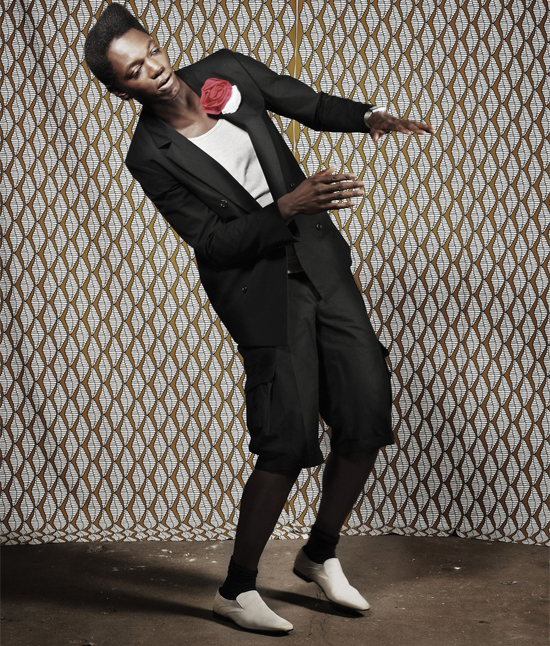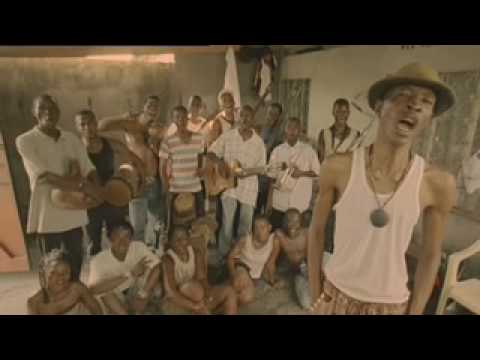"The energy in Kinshasa is something else," says Baloji before pausing, searching for the right way to describe the industrious and frenetic Congolese capital. The sound of the city throbs out of every bar of his second solo album, Kinshasa Succursale, which blends the expressive rap style that made his name in Belgium with the unmistakeable Congolese rhythm of collaborators like Konono No. 1. "Maybe it sounds strange, but I want to say that it is unique. It’s a city that was made for 500,000 people, and now there are 12 million living there. Nothing is really built for that. Everybody has to work hard and to address themselves to their situation, but they do it with elegance. It’s clichéd to say that African people always laugh, or African people are always friendly, but it’s true. There is a spirit there of people saying: ‘Let’s be creative, let’s find a way to make things work.’"
No wonder the loquacious rapper felt such kinship with Kinshasa. He was actually born in Lubumbashi, in the far south of the Democratic Republic of Congo, in 1978. His father was a wealthy businessman who had an affair with a young local woman, and at the age of three Baloji was sent to live in Belgium. By the time Baloji reached the age of seven his father had lost his fortune as a result of the fighting and political instability that still dogs the Congo, and the young boy lost all contact with him. He found himself attending a school for delinquent children run by nuns but left at 15 and to join rap collective H-Posse. They changed their name a couple of times over the years, first to Les Malfrats Linguistiques and then to Starflam, but they learnt fast and their 2001 album Survivant, released when Baloji was 23, went platinum.
Another Starflam album followed, but Baloji was already feeling restless when, in 2007, he was caught off guard by a letter from the mother he hadn’t seen in decades. He wrote his first solo album, Hotel Impala, partly as a way of telling her about his life. When he returned to the DRC to be reunited with her, he realised that the sounds of the Congo were just waiting to be incorporated into his music. "I wanted to do something organic," he says of the genesis of Kinshasa Succursale. "As hip hop artists, we were always trying to duplicate a certain sound from the late 60s, early 70s. I started thinking instead about taking samples from Congolese music, because it’s something that’s part of my heritage. It actually seems more natural than using the Stax or Motown catalogues, which people always use when they’re trying to create a hip hop vibe." However, rather than sampling, Baloji realised he wanted to play live with contemporary Congolese musicians. "The sound that comes from musicians playing together is very special," he adds. "I think that when they started putting overdubs on soul music they lost part of the spirit of the songs."
So Baloji, without any record label support, travelled to the Congolese capital to start recording. "The whole album was made and recorded in Kinshasa in six days, just to give it that sound and feel. We would rehearse a song for two or three hours, and then do a maximum of five or six takes. There are a lot of mistakes on the record! I’m sure if we had made this record in Belgium or anywhere else in Europe, we’d have been saying: ‘Oh, that take was not quite right’ and we’d have worked on it for two days. The fact that we had such a short time period meant that we couldn’t think too much, but we’ve created something that really touches me."
The news that an artist from Europe was recording an album spread quickly, and he was able to round up some incredible collaborators. The fingerprints of the legendary Konono No. 1 are all over the album’s lead track ‘Karibu Ya Bintou’. "I really wanted to work with them just because I’m a fan of their records," says Baloji, "I just had the idea that we could do something nice with a hip hop feel, and with the kind of basslines that I work on. I was convinced that we could make something together. I’m a big fan of what they’re doing."
Baloji tells me that much of the music was improvised from the "small sketches of songs" that he took with him, but the collaborative process was an education both for him and the Congolese musicians. He explains that despite his heritage, there were cultural gaps to bridge: "I’ve been to the Congo several times, but because I was raised in Europe for the Congolese I am a stranger. A lot of people from the diaspora have that experience, but growing up with two cultures doesn’t mean that you don’t have a culture, it just means that your culture is in-between. I talked a lot about that to people in Kinshasa, because it’s a difficult state. Even if you integrate in Europe, you’re still a black person. When you go to Africa, you’re still thinking like a white person. That’s the whole balance. For me, the thing is to accept that that is who I am, and to be proud of it. Not to be ashamed, and not to be too preachy and say, ‘We know better because we are from Europe, you’re from Kinshasa so you don’t know shit.’ I have so much respect for the Congolese musicians I worked with. We were playing some sessions and there were four guitar players in the room, but they had to wait their turn because there was only space for one guitar player to record at a time. We were there to share with them, not to say ‘This is what you have to do’."
[article continues after photograph]

If recording the record was enjoyable for Baloji, finding someone to release it was significantly less so. "It was really a lot of fun to make, and that’s the reason I fought for so long to release it. No labels were interested. It sat in a box for almost two years, because nobody wanted to give me a chance with this record. I was on EMI, but they didn’t like the record. Then I sent it to lots of cool hipster labels but nobody liked it! I was so desperate I decided to put it out myself. I read about how Prince released a record with The Mail on Sunday, and I wanted to do the same in Belgium. I got in touch with a weekly politics magazine, Le Vif, and they agreed to do it because the song ‘Indépendance Cha-Cha’ tied in with the fiftieth anniversary of the independence of Congo from Belgium. There is still a big relationship between Belgium and Congo. That was the only way for me to release the album, and I had to make the video myself. I made the whole thing myself because nobody believed in it. I love it, but nobody else did so we had to find a way to put it out so that people could understand it. I thought it deserved a chance, and I’m so happy it got one."
Baloji was suffering the curse of being innovative. "Trying to do something new causes big trouble. The labels were asking me to do something with all the big names of African music, people like Amadou & Mariam. It was always artists from places like Mali and Senegal, and I love them and respect what they’re doing but I’m doing something different. The funny thing is that all these cool labels are calling me now! It’s stupid! They didn’t realise it was cool when they had it before anyone else."
Having had to fight to get the record out there, Baloji can now enjoy its success and look ahead to a London show at the Barbican. If there’s a sadness that he cannot bring over the Congolese musicians who made the record, it is mitigated by fact that he’ll be playing instead with a group of Congolese musicians living in Europe who learned their trade playing with the legendary Congolese guitarist Franco, ‘The Rumba Giant of Zaire’. Baloji explains: "They are of that generation who were able to tour with Franco, and many of them stayed in Europe for several reasons. They couldn’t go back to the country because Franco had spoken out against Mobuto. At first Franco sang in support of Mobuto, but then he started to speak out and there was a conflict between them. That’s why they stayed in Europe, because it would have been a bad situation to go back to Kinshasa. They are all very talented, but also I think it’s great to work with these musicians for that reason."
After several years of struggle, Baloji has much to look forward to. I’m fascinated, though, to know what he foresees for the country where he was born and returned to love. Is he hopeful for the future of the Congo? Does he think that life there is improving? He thinks for a moment, then says "No!" with a laugh that acknowledges the enormity of the challenges the country still faces, fifteen years since the fall of Mobuto. Then he changes his mind: "No, sorry, I’m not being honest. Politically the situation is not improving, but in a city like Lubumbashi there is a movement that is really impressive. Big parts of the population no longer look to Europe as an El Dorado. It’s not the Promised Land any more. They are looking to countries like South Africa, Tanzania, Angola and Zambia, and that’s one of the most amazing things! They don’t care about Europe anymore, because culturally so much is coming from the south. Some things are really changing, and although it looks like it’s happening really slowly, it’s actually happening really fast. I’ve been really impressed by that energy and hope." Baloji pauses once more, perhaps realising that he’s back to describing that same creative spirit that inspired Kinshasa Succursale. Then, with a conviction born of experience, he says: "People really can make a difference."
Baloji plays the Barbican tonight, January 30th 2012. For more information, please



